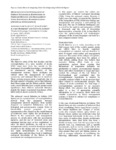Mostrar o rexistro simple do ítem
Methodology for integration of fisher's ecological knowledge in fisheries biology and management using knowledge representation (artificial intelligence)
| dc.contributor.author | García Allut, Antonio | |
| dc.contributor.author | Freire, Juan | |
| dc.contributor.author | Barreiro García, Álvaro | |
| dc.contributor.author | Losada Carril, David Enrique | |
| dc.date.accessioned | 2005-10-28T11:10:19Z | |
| dc.date.available | 2005-10-28T11:10:19Z | |
| dc.date.issued | 2003 | |
| dc.identifier.citation | HAGGAN, N., BRIGNALL, C. and WOOD, L. (eds). Putting fishers' knowledge to work. Vancouver, Canada : Fisheries Centre Research Report, University of British Columbia, 2003, vol. 11 (1), p. 227-237 | es_ES |
| dc.identifier.uri | http://hdl.handle.net/2183/109 | |
| dc.description | Presentado na International Conference "Putting Fisher's Knowledge to Work", Vancouver, Canadá, 27-30 agosto de 2001 | es_ES |
| dc.description.abstract | [abstract] The fisheries crisis of the last decades and the overexploitation of a great number of stocks (FAO 1995) have been due mainly to the inadequacy of scientific knowledge, uncertainties in assessments and/or failures of the management systems. These problems are critical when the management of coastal ecosystems and artisanal fisheries is involved. These systems possess great complexity due to the high number of human factors that influence their functioning and the fishing activity. Small-scale coastal fisheries have a much greater social significance than offshore industrial fisheries, despite the larger economical importance of the latter (only in macro-economic terms). The artisanal coastal fisheries in Galicia (NW Spain) are in a general state of overexploitation derived from the mismatch between management (derived implicitly from models designed for industrial finfisheries) and the biological and socioeconomic context. Freire and García-Allut (2000) proposed a new management policy (based on the establishment of territorial users’ rights, the involvement of fishers in the assessment and management process in collaboration with the government agencies, and the use of protected areas and minimum landing sizes as key regulations) to solve the above problems. As well as a new management system, research should pay special attention to the design and use of inexpensive and rapid methodologies to get relevant scientific data, and introduce local or traditional ecological knowledge of the fishers to the assessment and management process. In this paper, we analyze the values and characteristics of fishers’ ecological knowledge (FEK). Using the artisanal coastal fisheries of Galicia as a case study, we present the objectives of the integration of FEK in fisheries biology and management and propose a methodology for that goal. The use of Artificial Intelligence (AI) as a tool for the analysis and integration of FEK is discussed, and the role of Knowledge Representation, a branch of AI, is described to show the epistemological and technological adequacy of the chosen languages and tools in a non-computer science forum | es_ES |
| dc.format.mimetype | application/pdf | |
| dc.format.mimetype | text/plain | |
| dc.language.iso | eng | es_ES |
| dc.publisher | Fisheries Centre Research Report, University of British Columbia | es_ES |
| dc.title | Methodology for integration of fisher's ecological knowledge in fisheries biology and management using knowledge representation (artificial intelligence) | es_ES |
| dc.type | info:eu-repo/semantics/conferenceObject | es_ES |
| dc.rights.access | info:eu-repo/semantics/openAccess | es_ES |






